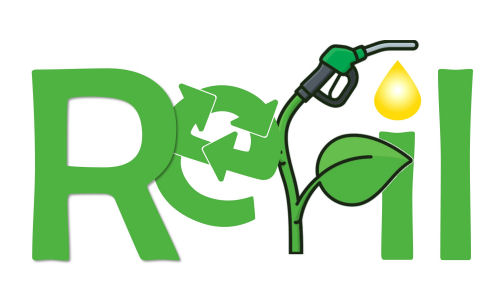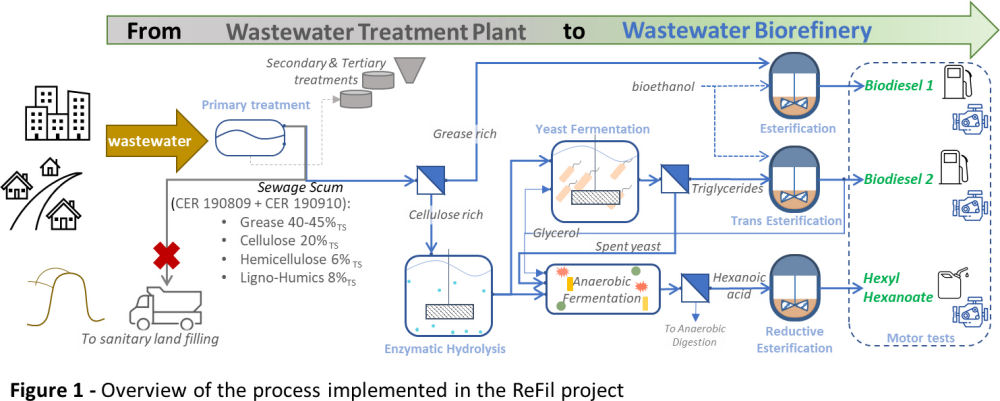 The research group thanks the PRIN 2022-Project ReFil “Renewable liquid Fuel of new generation from wastewater sludge: a step towards circular economy” funded by the European Union-Next Generation EU, Mission 4 Component C2 (code 2022KA5WL8, CUP I53D23001790006)
The research group thanks the PRIN 2022-Project ReFil “Renewable liquid Fuel of new generation from wastewater sludge: a step towards circular economy” funded by the European Union-Next Generation EU, Mission 4 Component C2 (code 2022KA5WL8, CUP I53D23001790006)
 The ReFil project studies the development of an integrated biorefinery approach for the valorization of the chemical and energetic potential of Sewage Scum (SS), an abundant special waste separated at the municipal wastewater treatment. SS (now requiring an expensive disposal) can represent a valuable lipid and cellulose source, both to be exploited as alternative cheap precursors for biofuels (i.e. not related to food or cosmetic). The grease rich fraction of SS (ca. 45%) will be efficiently separated and, for the first time, esterified with bioethanol for obtaining fatty acids ethyl esters (FAEEs, biodiesel 1), a last generation biodiesel. Instead, the cellulose-rich fraction of SS (CRFSS) represents a potential source of glucose, obtained by enzymatic hydrolysis, to be exploited with two different biological approaches, namely: a) the obtainment of medium chain length carboxylic acids (MCCs) and b) the bioaccumulation of triglycerides (TGs) with oleaginous yeasts (OYs).
The ReFil project studies the development of an integrated biorefinery approach for the valorization of the chemical and energetic potential of Sewage Scum (SS), an abundant special waste separated at the municipal wastewater treatment. SS (now requiring an expensive disposal) can represent a valuable lipid and cellulose source, both to be exploited as alternative cheap precursors for biofuels (i.e. not related to food or cosmetic). The grease rich fraction of SS (ca. 45%) will be efficiently separated and, for the first time, esterified with bioethanol for obtaining fatty acids ethyl esters (FAEEs, biodiesel 1), a last generation biodiesel. Instead, the cellulose-rich fraction of SS (CRFSS) represents a potential source of glucose, obtained by enzymatic hydrolysis, to be exploited with two different biological approaches, namely: a) the obtainment of medium chain length carboxylic acids (MCCs) and b) the bioaccumulation of triglycerides (TGs) with oleaginous yeasts (OYs).
a) The MCCs production through anaerobic fermentation of CRFSS-hydrolysate will be studied and optimized in microcosm and bench scale. The improvement of MCCs recovery will be assessed by adopting a bipolar membrane electrodialysis step (instead of current inorganic acid addition) which can allow coupling the obtainment of highly concentrated MCCs with the retrieval of Na+ added during the fermentation for its reuse. The recovered MCCs will be converted via reductive esterification into ester biofuels, in particular hexyl hexanoate (HexHex). Up to now this reaction has been scarcely studied, generally starting from pure commercial carboxylic acids. The development of an active and selective non-precious catalyst with proper stability will be studied to obtain fundamental kinetic and catalytic parameters to gather the knowledge for successive scale-up.
b) The TGs production through aerobic fermentation of CRFSS-hydrolysate by versatile OYs and their transformation to new generation biodiesel will be studied and optimized. The screening of various commercial yeast strains together with the definition of a tailored chemical formulation of fermentation media will be performed. Innovative reactors and green methods will be implemented for TGs extraction. The trans-esterification of TGs to FAEEs will be also optimized (biodiesel 2).
Finally, the characterization of engine performances of the novel ester biofuels (FAEEs and HexHex) will be performed on a test engine as they are or blended with conventional fuels, in order to verify their compatibility with the engine requirements in terms of performance, exhaust emissions and combustion characteristics. Thus, the ReFil project aims to assess the complete valorization of SS waste for the production of new generation biofuels coupled with a near to zero final discharge, adopting a novel integrated biorefinery scheme which offers a clear example of application of circular economy principles, turning almost totally a waste into resources.






